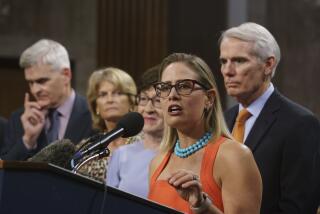Japan Business Lobby to End Donations to Political Parties
- Share via
TOKYO — Japan’s Keidanren (Federation of Economic Organizations), the country’s strongest business lobby group, said Thursday that it will stop its 38-year-old practice of gathering corporate donations to support political parties.
The decision struck an immediate blow to Japan’s former perennial rulers, the Liberal Democratic Party, which had been the principal benefactor of the businessmen’s benevolence, receiving at least $114 million annually. The middle-of-the-road Democratic Socialist Party, now part of an eight-party coalition running the country, will lose nearly $1 million a year.
The move opened the first crevice in the often collusive ties between business leaders and politicians, but the full extent of its impact was not immediately clear.
Gaishi Hiraiwa, Keidanren’s chairman, said the organization will recommend that its member corporations and industry associations “reduce contributions and head toward total abolition of political donations” within five years. Political funding, he added, ultimately should be provided through contributions by individuals and subsidies from the national treasury.
Keidanren’s contributions to the Liberal Democrats provided more than a third of the former ruling party’s income and were its most stable source of funds. Donations to the party started in 1955 under the excuse of “protecting a free economy in Japan” against socialism and communism.
Keidanren “never asked any favors in return,” said Yoshiro Mori, secretary general of the Liberal Democrats.
Mori said the Liberal Democrats would have to seek additional funds directly from corporations.
The decision represented a complete about-face: In June, Hiraiwa said that Keidanren would continue to support only the Liberal Democrats despite a split in the old ruling party and the emergence of three conservative opposition parties. The three parties are now members of the ruling coalition headed by Prime Minister Morihiro Hosokawa.
Other business groups advocated spreading donations across the field of both old and new conservative parties.
Hiraiwa said Keidanren will uphold promises it already had made to the Liberal Democrats, including helping the party repay $95.2 million of a total debt of $138 million accumulated since 1990. But for the remaining $42.9 million in debts, the business group told the Liberal Democrats they would have to find funding themselves elsewhere.
Ironically, the decision also stunned Hosokawa and his new coalition.
Although the 55-year-old former governor had forged his coalition on a promise of eliminating corporate contributions, a political reform plan that his coalition hammered out last week called only for a ban on corporate contributions to individual politicians--not to political parties.
Chief Cabinet Secretary Masayoshi Takemura, leader of the New Party Harbinger, said his party as well as Hosokawa’s Japan New Party, like others, will be forced to seek funds from individual corporations.
“Corporate contributions themselves are not bad. But the political situation has changed and public opinion has turned against the practice,” Hiraiwa said in an apparent reference to revelations that began last March of widespread bribery by dozens of construction companies.
Hiraiwa praised a Hosokawa reform proposal--criticized by the public--to provide $571 million in subsidies from the national treasury to political parties. “The public subsidies should be as big as possible,” he said.
More to Read
Sign up for Essential California
The most important California stories and recommendations in your inbox every morning.
You may occasionally receive promotional content from the Los Angeles Times.













